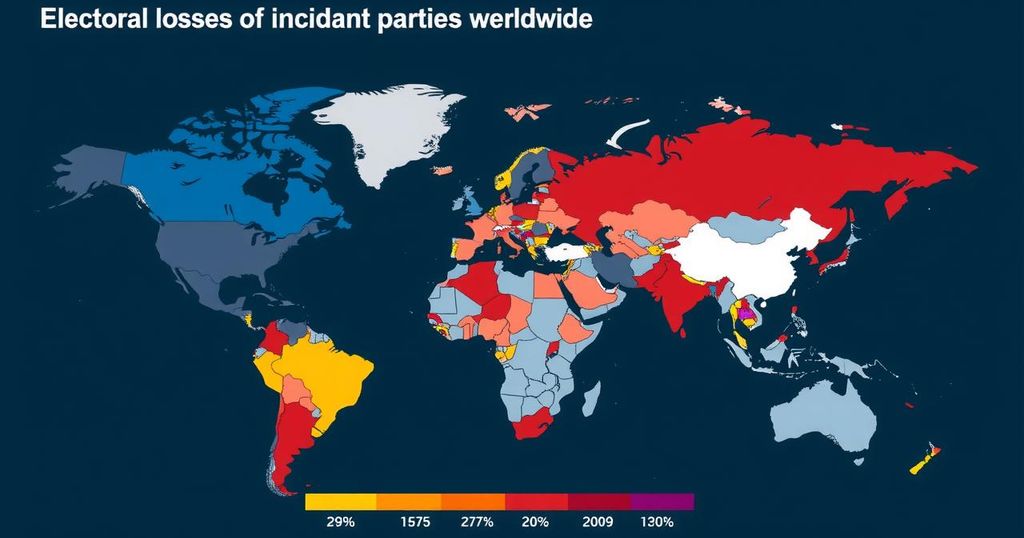Global Electoral Trends: Understanding Democratic Challenges in Recent Elections
This article analyzes the recent electoral losses for incumbent parties globally, with a focus on the Democratic party’s performance in the United States. The global trend reveals over 80% of incumbent parties in democracies lost ground, reflecting widespread voter dissatisfaction. Despite this, Democrats showed resilience in the electoral landscape, performing better than many counterparts in high-income nations, backed by a comparatively strong U.S. economy.
In the aftermath of recent elections, analyses of Vice President Kamala Harris’s campaign reveal that both domestic issues and global electoral trends significantly influenced Democratic outcomes. It is imperative to acknowledge that while Democrats faced defeat, they were not alone; incumbent parties worldwide experienced substantial losses. This year witnessed unprecedented voter turnout, with over half of the global population living in nations that held national elections, demonstrating widespread dissatisfaction with governments. Across democracies, over 80% of incumbent parties lost either seats or vote share, indicating a strong global trend of electoral discontent. Historically significant losses occurred in countries such as Japan, South Africa, and Botswana, where decades-long ruling parties faced major defeats. Similar upheavals unfolded in Senegal, where an opposition candidate secured a presidential victory without a runoff, while in Sri Lanka, voters decisively rallied against the incumbent government. In Europe, voters across 14 nations similarly repudiated their incumbent administrations during this electoral cycle, highlighting a stark contrast to the traditional advantages enjoyed by sitting governments. Despite these trends, Democrats performed relatively well compared to other incumbent parties within high-income nations, only experiencing minor losses. The Financial Times underscored that Democrats suffered one of the least severe vote share declines. Vice President Harris nearly won several key swing states, contributing to Democrats’ potential stability in the House of Representatives. One explanatory factor for Democrats’ comparatively lesser losses is the notably stronger performance of the U.S. economy relative to several nations afflicted by rising inflation and stagnating growth post-pandemic. However, voter concerns around inflation and housing costs overshadowed positive economic indicators, leading to discontent with the current administration. Additionally, some incumbent governments managed to maintain or even gain ground by emphasizing security issues during their campaigns. Countries such as Mexico and Finland saw electoral successes by prioritizing matters such as gang violence and national security. In the United States, while immigration remained a critical issue, broader national security concerns did not dominate the campaign. Ultimately, the trend of incumbent party losses reflects a broad wave of discontent originating from economic anxieties and public dissatisfaction, which hindered the Democrats’ campaign. Nevertheless, a glimmer of optimism lies in the prospect of the Democrats gaining from their experiences; the next electoral cycle will not see them operating from an incumbent position.
The global electoral landscape has presented a significant backdrop for the recent election outcomes in the United States, with widespread discontent towards incumbent governments evident across various democracies. As countries grappled with economic struggles exacerbated by the COVID-19 pandemic, political repercussions became apparent in the form of historic electoral losses for long-standing ruling parties. The cumulative effect of these global trends is crucial for understanding the challenges faced by Vice President Kamala Harris’s campaign during the recent elections.
In conclusion, the electoral pattern observed in recent elections highlights a pervasive trend of dissatisfaction with incumbent administrations globally, affecting the Democratic party’s performance in the United States. Although Democrats experienced losses, they fared relatively better than their international counterparts, attributing their endurance partially to the stronger American economy. As the political landscape shifts, Democrats look forward to future opportunities, as they will not be under the incumbency strain in the forthcoming election cycle.
Original Source: abcnews.go.com




Post Comment